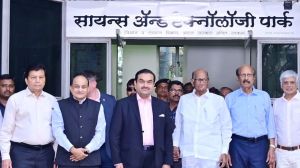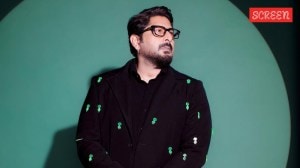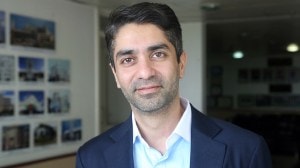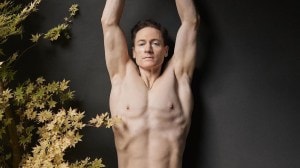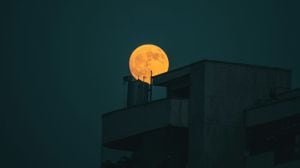In joy land
Bhutan. A hill kingdom that has shut out the tumult of change. In Paro, one of its small towns, feel the happiness in the air

The king is everywhere. He is on the 8216;long live8217; stickers pasted on the windscreen of trucks travelling between Phuentsholing and Thimpu, and he is on national television where traditional Bhutanese shows dominate programming. He is on the six-lane expressway that cuts through the mountains and allows the Nissans, Toyotas and Hondas to zip at 80 kmph on the last leg to Thimpu, and he is high up there on Druk Air, the only airline that operates from the Himalayan kingdom8217;s only airport in Paro. He is there when trekkers struggle up nearly 3000 feet from Paro to the Taktsang Monastery where, alongside the waste pits marked 8216;Biodegradable8217; and 8216;Non-degradable8217;, placards pronounce his 8216;benevolence8217;, and he is there enforcing a current ban8212;though often covertly breached8212;on chicken and tobacco. He is there too on a bottle of Special Courier whisky, which at Rs 20 for a peg is among Bhutan8217;s most expensive drinks and is a product marketed by government agencies. The King is just about everywhere in Bhutan.
He is there again, looking on from an overhead poster, as Sriram snips my hair at his modest little saloon in Paro. A poster of the King, Jigme Singye Wangchuck, is mandatory at business institutions, informs Sriram8217;s uncle Binod Thakur, and they had to buy theirs from a local bank. 8220;He is a good man, so nobody minds,8221; Sriram reasons. Many years ago, the Thakurs travelled up from Bihar 8216;s Darbhanga and away from the petty politics and crime that pockmarks life there, says Sriram. 8220;There is no class or caste divide here, and nobody bothers anybody. You don8217;t even need to lock up your home when you leave,8221; says Thakur.
Outside, the September evening air in Paro carries with it a faint nip. The streetlights are on and the Paro dzong8212;colossal administrative nerve centres cum monasteries that overlook most Bhutanese towns8212; glows in the distance. Only an hour after sundown, there are hardly any people on the only road that runs through the town. Without its inhabitants in sight, Paro looks like a film set left behind after the day8217;s shoot. Identical looking two-storied houses, following traditional Bhutanese architecture and a royal edict that forbids any other design, have now firmly shut the door on the outside world. Then come the dogs, creatures much respected by the locals even though some reportedly carry rabies. Paro has finally switched off. Barring the roar of the rain-fed river thundering down the valley, there is one more sound. Every night, exactly at nine, and till the man finishes 108 circles, the metallic bell above the giant Buddhist prayer wheel at the town square keeps count each time the man completes a round. Tong8230; tong8230; tong8230; tong8230; till sleep takes over.
8220;Yeah maan, it8217;s true,8221; the friendly, American University-educated owner of The Zone, the fashionable pub at Thimpu where the speakers play jazz and the mute television set plays European soccer, had exclaimed. I had asked him about Bhutan 8216;s biggest truism 8212; Gross National Happiness, as the King had earlier pronounced, over Gross National Product, the stress the country lays on an intangible something over real economics. The Zone is teeming with foreign employees of the WHO and the UN, all there, as a former Asian Development Bank consultant told me, to be part of the proceedings when Bhutan, reportedly one of South Asia8217;s fastest growing economies, stands in queue to vote in its first democratically-elected government next year.
The coming of electoral politics has brought its own set of complications. Used to seeing yellow as the King8217;s colour, people reportedly voted en masse during the recent mock elections for a party that used the same widely-respected colour on its logo. Sonam Dorji8212;who had guided us from the majestic National Museum to Paro town after crossing the wooden bridge8212;faces a crisis at home. He has been nominated as the People8217;s Democratic Party candidate from Paro, while his wife will be contesting the same election under the opposing Druk Phuensum Tshogpa banner. 8220;These days,8221; Dorji mentioned with anxiety, 8220;we either fight or remain silent at the dinner table.8221;
Yet, the intangible something is palpable, and happiness seems like an everyday affair in Bhutan. There8217;s happiness in being on empty roads which head into blue mountains, on which tufts of cloud spend comatose hours after getting caught among the trees. There8217;s apparent happiness and pride in wearing the national dress, the gho and the kira, which men and women respectively, across ages, patronise. Happiness resonates in the outer room at the enticing Taktsang Monastery, perched perilously at the edge of a 2000-foot rock face, where monks chant their prayers, beat at gongs, blow at air instruments and pass on warm tea and cookies to visitors.
Half an hour ahead of India time, and many decades after the world bit the bait of a uniform code of lifestyle and entertainment, Bhutan seems happy to be still settled in an age largely innocent to the ways of the rest. Happiness in Bhutan, I begin to realise, is in the repetitive tong, tong, tong.
- 01
- 02
- 03
- 04
- 05









